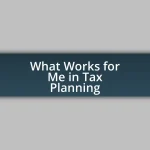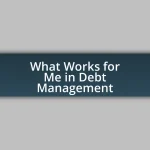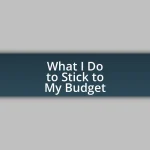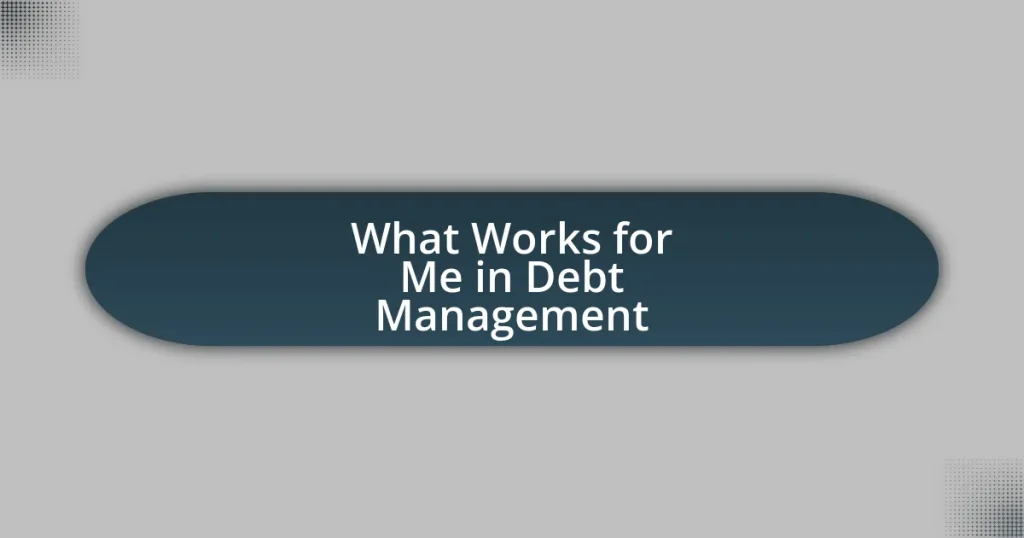Key takeaways:
- Understanding debt involves recognizing the emotional connections and spending habits behind it, leading to realistic planning for repayment.
- Setting clear, measurable financial goals provides direction and motivation, making it easier to track progress and celebrate milestones.
- Creating a realistic budget requires tracking income, categorizing expenses, and reviewing regularly to make mindful financial choices.
- Effective negotiations with creditors are based on preparation, calm communication, and persistence, which can lead to favorable outcomes.
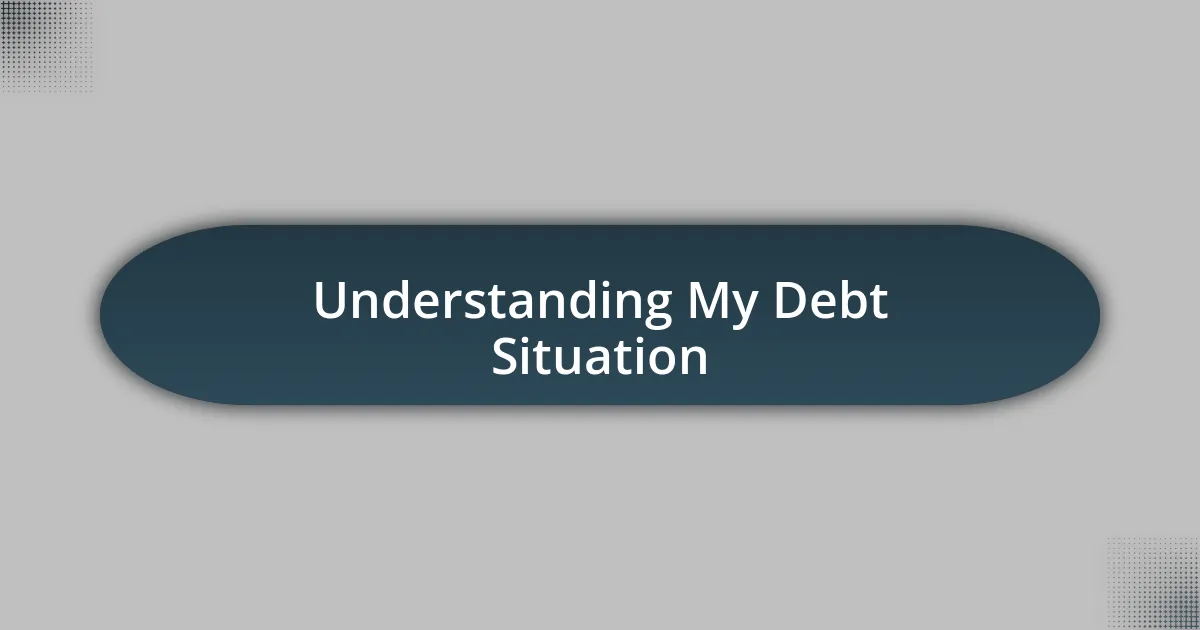
Understanding My Debt Situation
Understanding my debt situation has been both an eye-opening and humbling journey. I remember the moment I sat down with my bills scattered across the table, feeling like I was staring at a mountain I couldn’t climb. Have you ever felt that weight? It’s a mix of anxiety and confusion that can make even the simplest tasks seem daunting.
As I began to dig deeper, I realized that understanding my debt wasn’t just about the numbers; it was also about the emotions tied to them. Each debt had its own story—like the credit card used for an impulsive shopping spree or the loan that felt necessary but ended up being a heavy burden. Reflecting on these choices helped me connect the dots and truly grasp what had led me to my current situation.
In analyzing my debt, I discovered patterns in my spending habits that contributed to my financial woes. I found myself asking, “What purchases brought me joy, and which ones were just temporary distractions?” This self-reflection was tough, but it was crucial for taking responsibility and finding a way out. Only by understanding my debt situation could I start to create a realistic plan for moving forward.
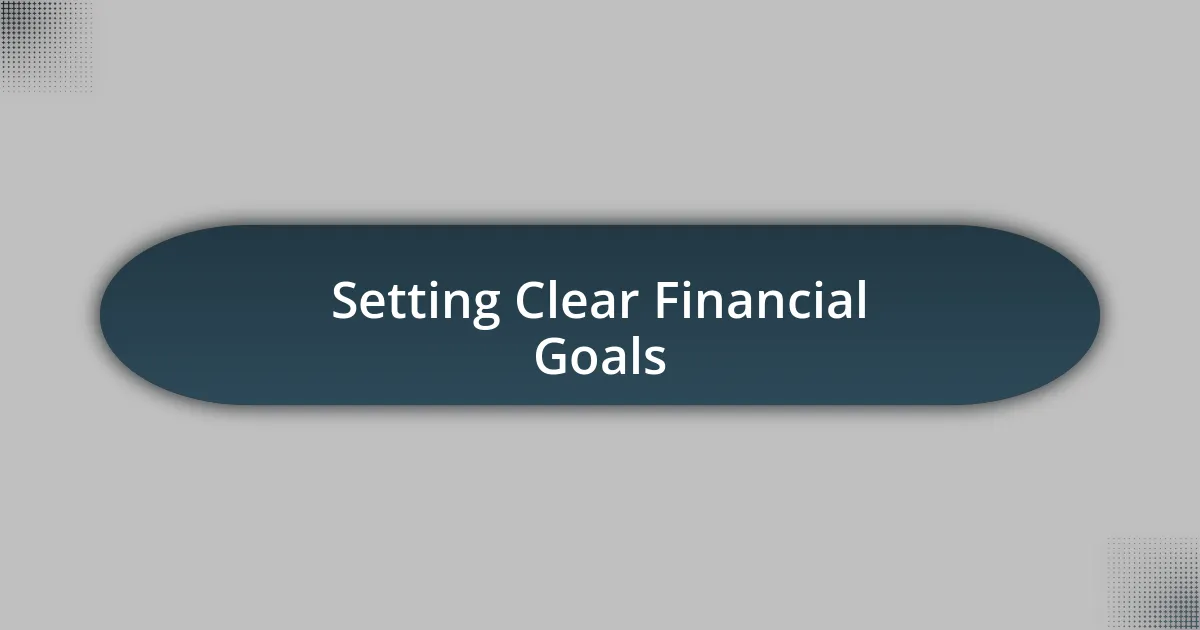
Setting Clear Financial Goals
Setting clear financial goals is a vital step in effective debt management. I remember the first time I set specific goals; it felt empowering to transform my vague desires into concrete targets. Instead of simply saying, “I want to get out of debt,” I defined my goal: “I will pay off $5,000 in debts within the next 12 months.” This clarity not only provided direction but also made it easier to track my progress.
Having measurable goals also allowed me to celebrate small victories along the way. When I reached my first milestone, it was like a weight lifting from my shoulders. It’s amazing how these achievements, no matter how small, fueled my motivation and reinforced my commitment to staying on track. By breaking down the larger goal into smaller, digestible tasks, I cultivated a sense of accomplishment that kept my spirits high.
It’s crucial to revisit and revise your goals periodically. Life throws curveballs, and financial situations can change unexpectedly. For instance, when I had an unexpected expense pop up, I learned to adjust my timelines and focus on what truly mattered. By staying flexible and adapting my goals to my situation, I maintained a realistic and achievable path toward financial freedom.
| Goal Type | Description |
|---|---|
| Short-term Goals | Immediate targets to address urgent debts (e.g., pay off credit card by next month). |
| Medium-term Goals | Targets for the next 1 to 3 years (e.g., create a fully-funded emergency fund). |
| Long-term Goals | Goals set for 3+ years, focusing on overall financial health (e.g., saving for a home). |
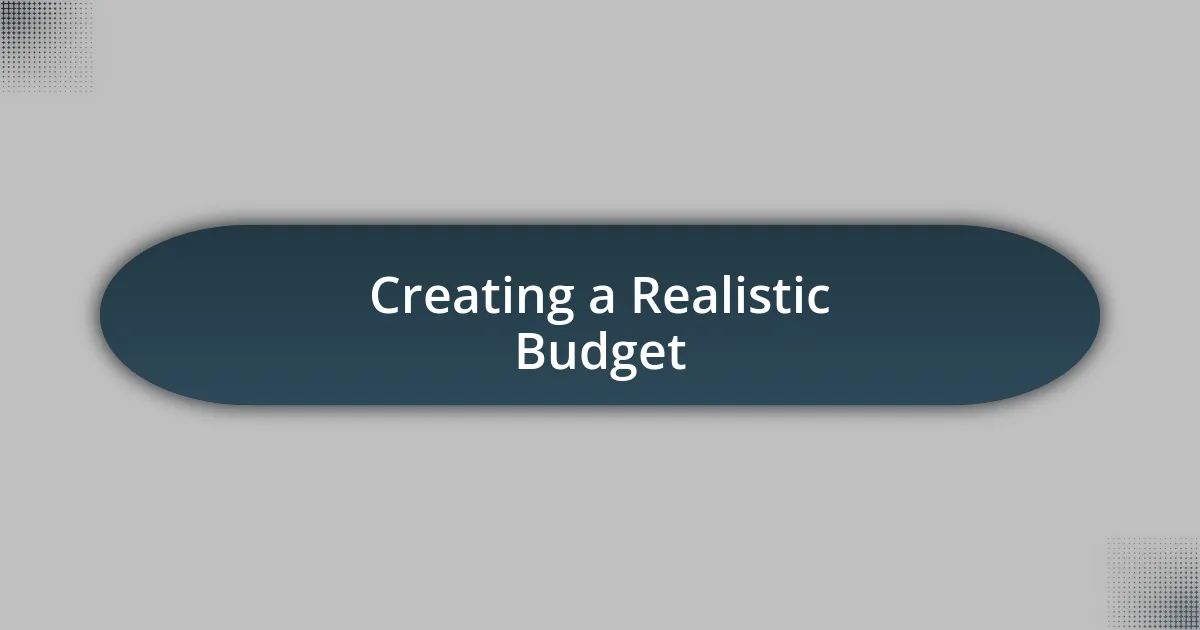
Creating a Realistic Budget
Creating a budget that reflects your reality can be a game-changer in debt management. When I first sat down to create my budget, I had this moment of clarity; it wasn’t just about cutting expenses, but understanding where my money was truly going. I took time reviewing my past spending habits, and that honest assessment helped me identify areas I could adjust without feeling deprived.
Here’s a practical approach to crafting a realistic budget:
- Track Your Income: List all sources of income, ensuring you account for any irregular earnings.
- Categorize Expenses: Divide expenses into fixed (like rent) and variable (like dining out).
- Set Limits: Assign spending caps for each category based on your income and priorities.
- Plan for Emergencies: Always include a buffer for unexpected expenses; life happens, after all.
- Review Regularly: At the end of each month, analyze how your actual spending compared to your budget.
I still remember the relief when I first balanced my budget and realized I wasn’t obsessively counting every penny. It was more about making mindful choices, and that shift in mindset transformed budgeting from a chore into a helpful tool for empowerment.
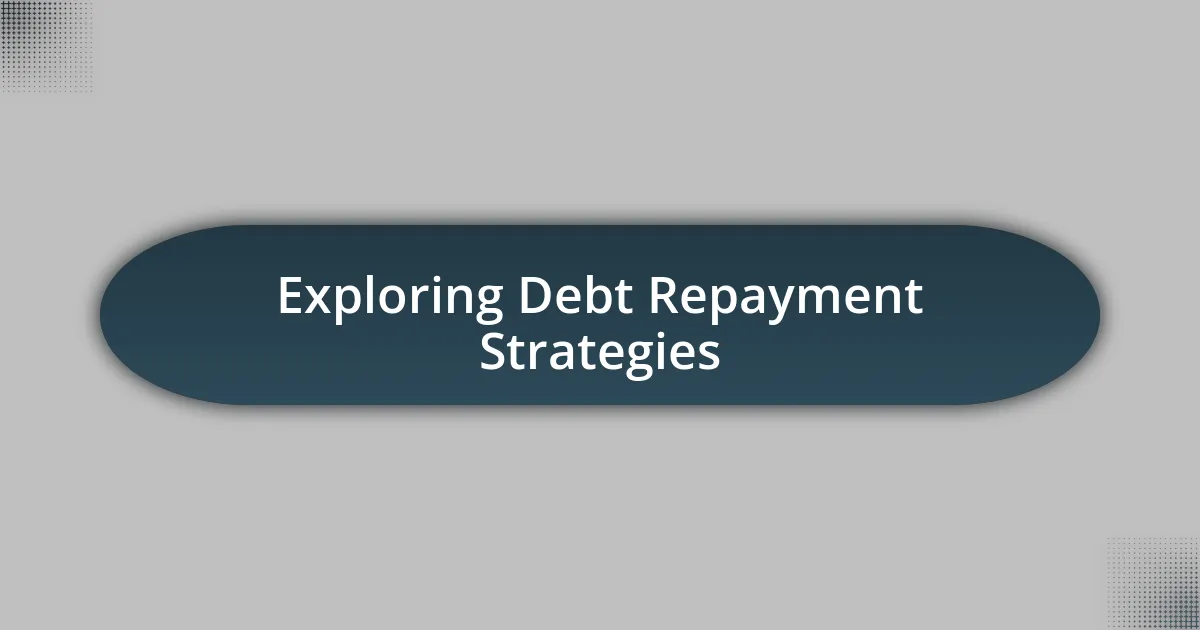
Exploring Debt Repayment Strategies
Exploring different debt repayment strategies can feel overwhelming, but I’ve found that two main approaches stand out: the snowball method and the avalanche method. When I first considered these strategies, I was stuck between wanting quick wins and seeking long-term savings. The snowball method—where you pay off your smallest debts first—gave me a sense of accomplishment that fueled my motivation. It felt incredible to cross those early debts off my list!
On the other hand, the avalanche method focuses on tackling the debt with the highest interest rate first. This strategy takes more discipline, but I discovered it can save you money in the long run. I remember the day I made the switch; it felt like I had a game plan that wasn’t just about winning small battles, but about winning the war against debt.
As I navigated these strategies, I learned the importance of staying flexible. Life throws curveballs, right? One month, I found unexpected expenses creeping in, and sticking rigidly to one method felt daunting. So, I adjusted my plan and recalibrated my focus—every step forward, no matter how small, felt significant and kept me on track.
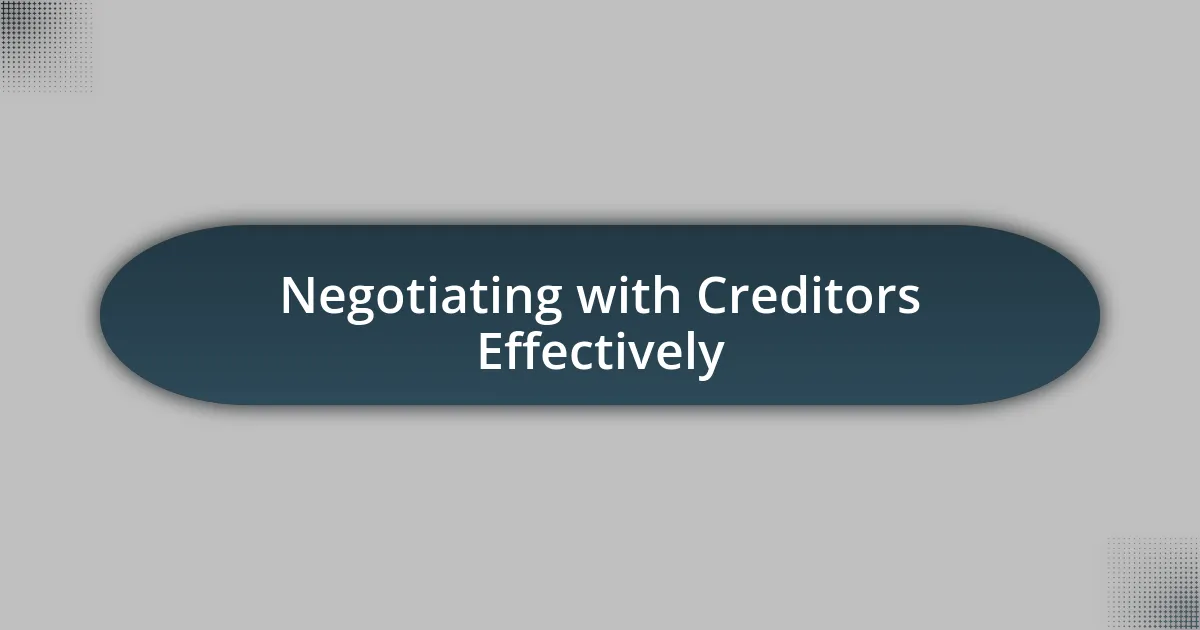
Negotiating with Creditors Effectively
When I first approached my creditors, I was filled with anxiety. I remember the pit in my stomach before making those calls. But I learned that approaching negotiations with confidence made a huge difference. My strategy was simple: come prepared with information about my financial situation and a clear proposed plan. I found that when I communicated genuinely, many creditors were more willing to listen and explore options with me.
One practical tip that I discovered is to remain calm and composed during negotiations. I had an experience where I was met with an aggressive response from a creditor, and instead of escalating the situation, I took a deep breath and refocused the conversation on finding mutual ground. This approach not only led to a more productive discussion, but it also helped me feel more in control of my circumstances. Have you ever found that staying calm in a tense situation can turn everything around?
Throughout the process, I realized the importance of persistence. There were times I didn’t get the answer I wanted right away, but I didn’t let discouragement take over. After several conversations, I ultimately negotiated reduced payments and even had some late fees waived. It’s remarkable how a genuine, determined effort can lead to favorable outcomes when negotiating with creditors. Keep in mind that you are advocating for your financial well-being, and that’s worth fighting for.
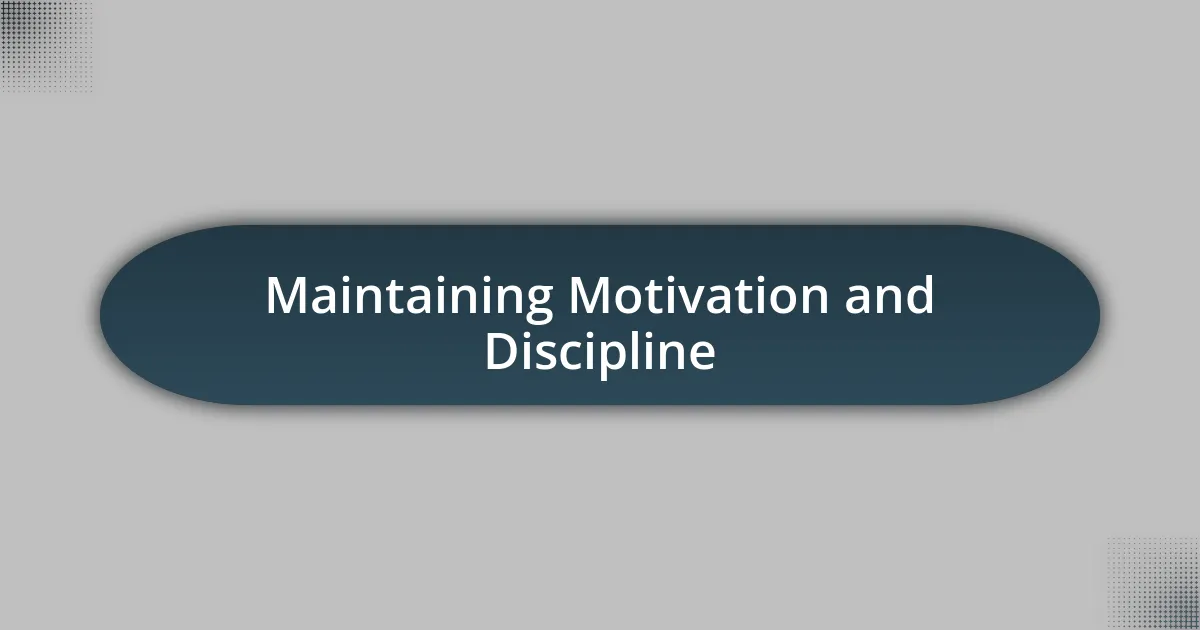
Maintaining Motivation and Discipline
One of the keys to maintaining motivation while managing debt is setting small, achievable goals. I remember when I first started my journey, I felt overwhelmed by the total amount owed. To tackle this, I broke it down into manageable milestones, like paying off a specific bill each month. Celebrating those small victories, like treating myself to a favorite coffee when I met a goal, reinforced my motivation and kept me focused on the bigger picture. Have you ever found that a small reward can spark joy and encourage you to keep going?
Discipline, on the other hand, can sometimes falter due to life’s unexpected twists. There were moments when my resolve wavered, especially when faced with tempting new purchases or social outings. To combat this, I created a simple budgeting plan that I stuck to religiously, even when it was challenging. A reminder of why I started—financial freedom—was often what brought me back to discipline. I even placed motivational quotes around my space, making it harder to stray from my goals. What strategies have you found effective in building your own discipline?
Lastly, I discovered that surrounding myself with supportive friends and family made a world of difference. There were times when I felt alone in my efforts, but having a close friend who understood what I was going through gave me that extra push. They would check in on my progress and celebrate my achievements, no matter how small. It made me realize that accountability is a powerful motivator. Who do you have in your corner that can help keep you focused and inspired in your journey?
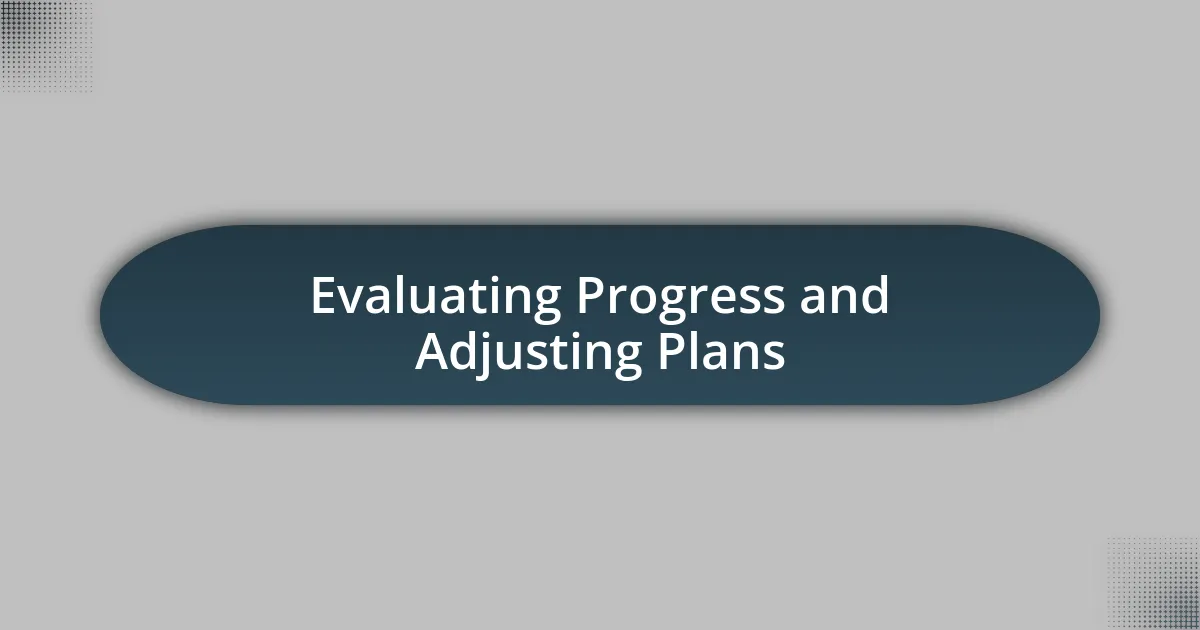
Evaluating Progress and Adjusting Plans
To effectively evaluate progress in debt management, I found it essential to track my payments diligently. Each month, I would sit down with my budget and note down exactly how much I had paid off. This practice not only allowed me to see the tangible effects of my efforts but also gave me a sense of accomplishment. Have you ever felt that rush of satisfaction when you check off a task? It motivates you to push further, doesn’t it?
Adjusting my plan became necessary when I hit unexpected financial hurdles. I recall one month when I faced an unexpected medical bill that threw my budget off course. In that situation, I had to reassess my goals and reallocate funds from less urgent expenses. Keeping flexibility in my plan was crucial. Have you ever had to rethink your strategy? It’s not a setback; it’s an opportunity to refine your approach.
Having regular check-ins with myself proved incredibly valuable. I scheduled a monthly reflection session where I would review not just my financial progress, but also my emotional state throughout the journey. During these sessions, it became clear that pursuing debt management wasn’t just about numbers—it was about the peace of mind that comes with financial stability. Have you taken the time to reflect on how you feel about your financial journey? It might just be the key to staying motivated and focused on your goals.



